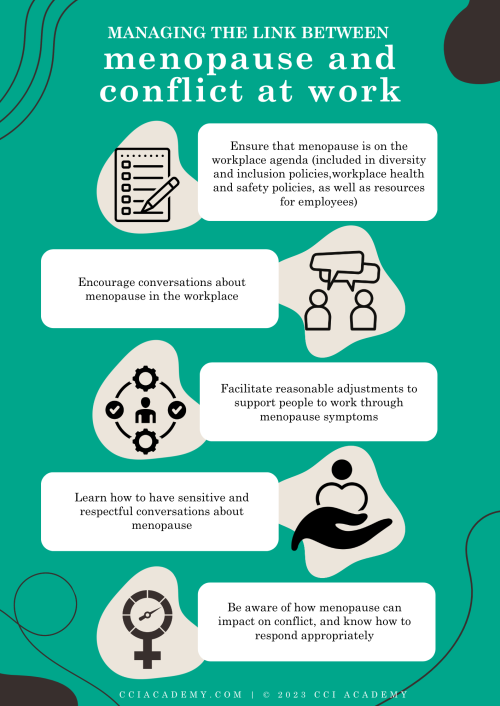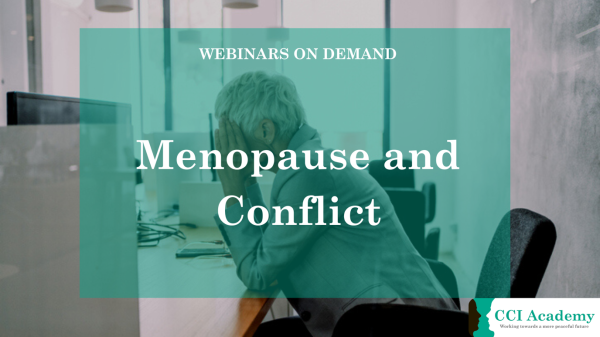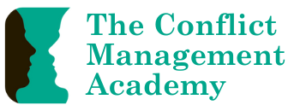THIS SPECIAL EDITION OF CONFLICT MATTERS has been written by Carol Bowen, presenter of our webinar about menopause and conflict.
In the past ten years of my conflict resolution practice, it became clear to me that there was an increase in my coaching work of people, roughly between the ages of 40 and 55, desperately seeking support to deal with conflict at work which, incidentally, rolled into the home also. As I helped these people unpack their stories and the impact on them, their loved ones, and their colleagues, I started to wonder where they might be on their menopausal journey. What these people seemed to have in common were mood swings, lack of sleep and irritability. Now these symptoms aren’t only associated with menopause; they can be a direct result of conflict or some other condition or illness. However, when considering a bigger picture of other possible factors and symptoms, coupled with age range and a lack of knowledge, and understanding about menopause, you may well be dealing with more than merely conflict at work. What would this be like for people who have not made the link and are not aware that they may be menopausal and experiencing uncomfortable symptoms which, as a result, is causing conflict at work?
Throughout my life and career, I’ve faced many challenges—some of them seemingly insurmountable. Fortunately, I have always managed to overcome them without too much long-term impact. In my late-forties perimenopause arrived, and this challenge was different. It mentally and physically dominated my life until I found the right treatment for me. I am not alone of course, menopause happens to people who make up at least half of humanity and these include cis women, trans men, non-binary, and intersex people.
While many have heard of menopause, many are unaware it is preceded by perimenopause. This is the time when ovaries gradually begin to make less estrogen and progesterone. It usually happens in a person’s 40s but can start in their 30s or, in some instances, even earlier. Menopause is the term for the final menstrual period. The last menstrual period is identified when it has been absent for one year. Post menopause are the years after menopause.

Perimenopause and menopause symptoms are varied. They may include hot flushes, mood swings, panic attacks, night sweats, brain fog/memory loss, nightmares, insomnia, depression, headaches, irritability, weight gain, joint pains, and the list goes on. Lack of sleep alone can wreak havoc on our lives. Among other things, sleep is crucial for our health wellbeing, memory, and mood. Short term sleep problems can impair our ability to think, remember and process information, making us feel moody and irritable. Consequently, we become much more susceptible to conflict as we struggle to manage other menopausal symptoms. Imagine the cumulative effect of lack of sleep when you are a busy working professional, potentially managing weighty family or personal issues also. The impact of this can shake a person’s identity, as they struggle to cope with such significant changes in their life. This is even more the case if they have never been exposed to or been made aware of just what’s happening to them. Further complicating matters, some of above symptoms mirror other conditions or illnesses. In my research I have discovered many people incorrectly diagnose their menopause as early onset dementia, as they go from being professional and articulate speakers, to struggling to find the right words to convey their message. This leads to a decline in confidence and self-worth. Imagine how this might feel if you have always been a successful businessperson and suddenly, no longer feel that way, yet don’t realise why. How might this, coupled with the other symptoms described above, show up in the workplace? Most often, they show up as conflict if there is a lack of understanding and support.

For many, perimenopause is a mental and physical seesaw. Because of the hormonal changes happening in the body, anger and irritability may be elevated. Often people experiencing menopause resent when they are misunderstood or not supported in the right way. They may also be frustrated because they are putting on weight or having very uncomfortable and frequent hot flushes. Changes in emotional states are also difficult for those around them. These people may become the misplaced target of those emotions, especially at work. That said, not every mood change is necessarily tied to menopause so it’s always good to explore what is going on for that particular person and this is where conflict management coaching can be extremely helpful, not only for the individual, for line management or family members also.

The correct diagnosis is fundamental. The best practice is for people to visit their GP to confirm their diagnosis and, most importantly, gain a treatment which is best suited to them. No one person is the same and, as such, treatments are varied. Treatments include hormone replacement therapy, alternative therapies, nutrition, exercise, sleep hygiene, abstinence from alcohol, caffeine, and spicy food. It is important for anyone experiencing menopause to discuss treatment options with their GP or menopause specialist.

Helping people make the connection between their workplace conflict and menopause became a goal in my conflict resolution practice. I do this carefully by building and deepening rapport and sharing a small piece of my own lived experience to help make that connection and I am compassionate and hold space for them. I might recommend they visit their GP and ask for a blood test if they become curious about whether they are indeed menopausal. Many people came back to coaching with a correct medical diagnosis and were able to get the appropriate treatment for them. Eight out of 10 were able to re-evaluate their conflict stories and develop options to restore working relationships. Once symptoms cleared up through treatment, lives returned to normal, and moods regulated. This, coupled with new education, resources, and workplace adjustment, resulted in the conflict dissipating. Imagine if we could achieve this on a much bigger scale.

Apparently, there is a menopause revolution happening around the world. I’m not sure its reach is far or wide enough. We are not speaking enough about menopause and how it impacts people and workplaces. According to Thea O’Connor from menopauseatworkasiapacific.com, menopause has been missing from diversity and inclusion and WHS agendas, despite the fact it affects half of humanity. What are some of the initiatives or treatments you have in your workplace or home to support people experiencing menopause? What conversations are you having? If there are none, perhaps it rests with you to start the initiative.

Some of the options to support people already exist in today’s workplaces. It could be as simple as providing flexible working arrangements to accommodate a person’s symptoms. It could include access to menopause information and knowledge. It could also take the form of conversation corners where people can chat to share experiences and knowledge. It could be supervisor/manager training to help build skills and knowledge to be able to support staff experiencing menopause.
In the vacuum of such support, there is the potential for workplaces to continue to lose the exceptional skills and knowledge of menopausal people, because they don’t feel supported or understood and, due to the lifelong stigma of menopause, won’t speak up about it. We need to create that supportive space for them and not be afraid to start the conversation. However, we must do it from a place of compassion and understanding. We can only do this if we are menopause educated and resourced.

Back in Victorian times people with menopause were described as hysterical and placed into asylums. Thankfully we’ve come along in leaps and bounds. But we are still on the journey and yet far from our destination. What will your contribution be and if you see someone struggling—will you ask how you can help? Too many line managers have assumed (menopausal) people are troublemakers and take action to manage their performance, rather than asking what’s motivating behaviour. Vive la révolution!

WANT TO KNOW MORE?
Check out our webinar on demand: Navigating the Menopause Minefield: Exploring the Intersection of Menopause and Conflict. https://www.conflictmanagementacademy.com/webinar-on-demand-menopause-and-conflict/

Carol brings a wealth of expertise and knowledge to her conflict resolution practice, with a passion for people and a clear focus on helping client’s deliver required business outcomes when conflicts get in the way of success. Her sense and understanding of human conflict and relationships is very highly regarded by clients and this is reflected in the high degree of success achieved in her mediation, coaching and training engagements. Her practice has taken her into the private and public sector within Australia and overseas.
Carol is a Fellow member of the Resolution Institute. She is a Nationally Accredited (Advanced) Mediator, a CINERGY ™ Conflict Management Coach; Mentor and Assessor, a Group Facilitator, a Restorative Engagement Facilitator and Coach; an Interactive Problem-Solving Coach and a Conflict Resolution Trainer. She was a former Chair of the Queensland Chapter of Resolution Institute and holds a Resolution Institute award for the Creative adaption of Dispute Resolution to meet specific needs. She was a finalist in the Australian Disputes Centre 2022 Conflict Coach of the year award.

